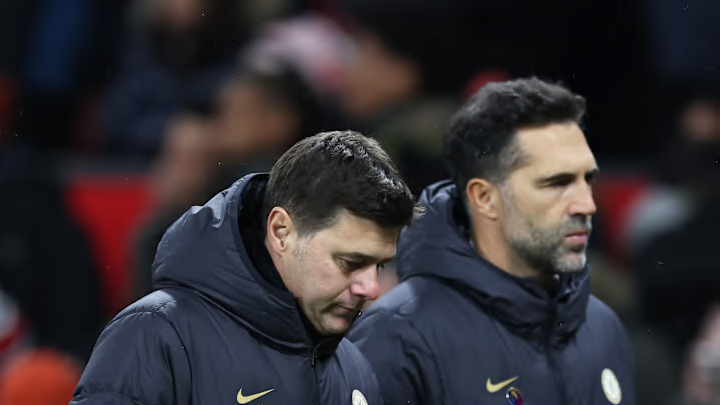In a disheartening night for Chelsea fans, the team's lackluster performance led to a disappointing loss against Manchester United at Old Trafford. Contrary to optimistic expectations, fans were dismayed by the team's underwhelming performance on the field. The players narrowly averted a more substantial loss, preventing Manchester United from securing a margin other than the final score of 2-1. Here are three talking points from the match.
1. Mauricio Pochettino could not get anything right on the day
The questionable lineup choices, such as deploying Marc Cucurella, a left-back, in the right-back position and featuring Levi Colwill, typically a center-back, as a left-back, left many scratching their heads. The decision to sideline one of the best right-backs globally, Reece James, added to the perplexity. Plus, not including Benoit Badiashile, who's been pretty solid, got people wondering and asking questions.
During critical junctures of the game, where Pochettino had opportunities to influence the team's performance, such as during breaks for injuries to Manchester United players like Bruno Fernandes and Scott McTominay, or when the assistant referee's device malfunctioned, the manager seemed unable to make impactful changes. Even during the halftime team talk, Pochettino's influence on the team's dynamics appeared limited, as the players returned to the field without displaying any noticeable improvements or adjustments.
The match highlighted Pochettino's lack of a clear tactical strategy, leaving the team disorganized and raising doubts about his ability to guide and implement effective game plans. Fans and critics are now questioning the team's future direction under Pochettino.
2. Nicolas Jackson's performance in front of goal was subpar once again
Chelsea struggled to create many scoring opportunities during the match. Despite this, Nicolas Jackson had two golden chances to make an impact. In the first half, a well-timed pass from Raheem Sterling set him up one-on-one with Manchester United goalkeeper Andre Onana. Unfortunately, Jackson's decision to take an extra touch instead of a quick shot allowed Onana to make a straightforward save.
The Senegalese striker had another opportunity in the second half, receiving a header chance inside the six-yard box. However, he failed to capitalize on the chance, once again missing a crucial opportunity to find the back of the net.
Jackson wasn't the sole culprit; in the first half, Mykhailo Mudryk had an opportunity to deliver a decisive pass to Sterling in a dangerous position, with the attempt proving weak and promptly cleared by Fernandes. Chelsea had other fleeting instances where they appeared poised to inflict damage, the final pass or the moments leading up to it falling short, leaving them unable to capitalize on these rare opportunities.
3. Chelsea's horrendous display in their half
Goalkeeper Robert Sanchez consistently delayed clearing the ball until the last possible moment when a Manchester United player closed in, inadvertently returning possession to the opponent.
Moises Caicedo's lackluster touches inadvertently created opportunities for the hosts by exposing vulnerabilities in Chelsea's defense. His ineffective impact not only failed to open up chances but also contributed to the pressure faced by the visiting team.
Chelsea's endeavor to build from the back was nothing less than appalling. Despite the noticeable drawbacks of the playing-from-the-back approach, Chelsea continued to employ this strategy throughout the match. The reluctance to adapt raised questions about the team's tactical flexibility and decision-making on the field.
The match witnessed a flurry of miss-passes from Chelsea players, drawing criticism even from commentators. The frequency of these errors highlighted a lack of precision and coordination, further diminishing Chelsea's performance.
Recurrence of defensive lapses proved costly for Chelsea once again. Similar to recent matches, a marked player found himself unattended inside the six-yard box, as Scott McTominay capitalized on the defensive lapse, emphasizing the team's failure to rectify fundamental errors. This time, luck played a part in the ball finding Sanchez directly. But time and time again, Manchester United players were space inside Chelsea's box, let alone the six-yard one, highlighting a persistent vulnerability in the team's defensive structure.
